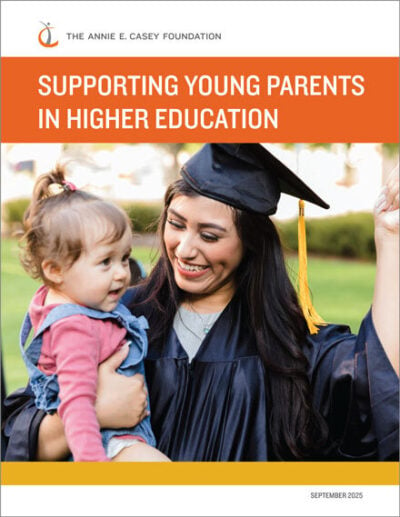Summary
This resource from the Annie E. Casey Foundation explores strategies aimed at helping young parents succeed in college. This population of over 3 million undergraduates with kids — 275,000 of them under the age of 25 — must navigate substantial barriers while striving for a better future.
About the Expanding Opportunities for Young Families Initiative
The Foundation’s Expanding Opportunities for Young Families initiative demonstrates that colleges and communities can better align academic, financial and social resources to help improve outcomes for young college students and their children.
Community colleges in Austin, Miami and Santa Fe participated in the Foundation’s initiative with a goal of helping young parenting students achieve both educational success and greater family stability. From 2019 to 2024, these sites and their partners tested practices designed to help young parents enroll in community college and stay on course through graduation. Each college leveraged practices that aligned their resources and their parenting students’ needs. Strategies included offering student success coaches, parenting student advisory groups, flexible academic programs and designated liaisons to help families navigate the resources available to them.
Barriers to College Completion for Parenting Students
Common hurdles that young parenting students face include:
- Delayed college entry and low completion rates due to caregiving duties and lack of support.
- High financial strain, with parenting students more likely to incur debt and less likely to receive family support.
- Lacking a sense of belonging on campus, leading to feelings of isolation and mental health strain.
- Struggling to meet basic needs, such as with housing, food and child care.
- Despite facing higher rates of poverty, housing insecurity and student debt, young parents are deeply motivated to earn degrees that lead to family-sustaining careers.
Practice Recommendations to Support Student Parents
The brief shares evidence-based practices that institutions of higher education and community partners can adopt. This advice includes:
- Building pathways to college by offering pre-enrollment support, translated materials, summer bridge programs and GED access.
- Engaging parenting students through advisory councils, peer leadership roles and compensated participation in planning.
- Supporting the basic needs of parenting students through emergency funds, child care referrals, mental health services and centralized resource guides.







